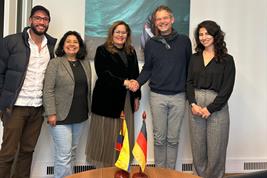17.10.2024

In the lead-up to COP 16 in Cali, Colombia, a crucial conference to address global biodiversity, Ambassador of Colombia to Germany, H.E. Yadir Salazar-Mejía, met with Prof. Dr. Stefan Sieber, Assoc. Prof. Dr. Michelle Chevelev-Bonatti, Mr Sergio Bolivar Santamaria, and Ms Adriana Martin from the SusLAND group of the Leibniz Center for Agriculture Landscape Research (ZALF) to discuss groundbreaking opportunities for research and collaboration in the fields of nature conservation and agriculture.
The dialogue highlighted the critical interconnection between these two sectors, emphasising the transformative potential of joint efforts to build a more sustainable future in both countries. Key points of the discussion included:
-
Integrating science into the cooperation agenda: Integrating science into the cooperation agenda is imperative to achieving tangible outcomes in nature conservation and climate protection.
ZALF's extensive presence in Colombia, working in partnership with local organizations, has pioneered an integrative model that integrates science to develop evidence-based policies and strategies for sustainable land use. For example, the novel project to
protect, manage, and restore Grasslands and Savannahs in South America, funded by the IKI programme of the BMUV. By combining scientific research with implementation on the territories, ZALF contributes to transforming practices rooted in evidence and local knowledge. -
The nexus between Peace, Nature, and Agriculture: In response to the country's need for peacebuilding for a thriving Colombian society, pace with nature, ZALF and the Embassy highlight the potential role of ZALF in examining the critical role of nature conservation and sustainable agriculture in fostering peace and stability, particularly in regions affected by conflict or environmental degradation.
-
Scientific Diplomacy and Cooperation: Strengthening scientific infrastructures in Colombia and Germany through collaborative research projects, collaboration with the diaspora's scientific community and networks, such as BioGeCo and Menzypol, and capacity-building initiatives, including the support and promotion of German PhD researchers in Colombian universities, and increasing education and scientific mobility also from Germany to Colombia.
This meeting marks a significant step forward in addressing the entangled challenges of biodiversity loss, peace, climate change and agricultural production. The Embassy of Colombia and ZALF are committed to strengthening the bilateral collaboration and develop high impact scientific projects to promoting sustainable development for both nations. The dialogue lays the groundwork for future collaboration.
Further Information:
